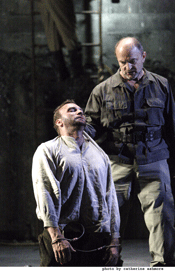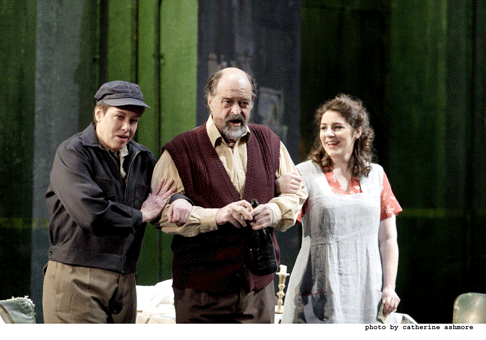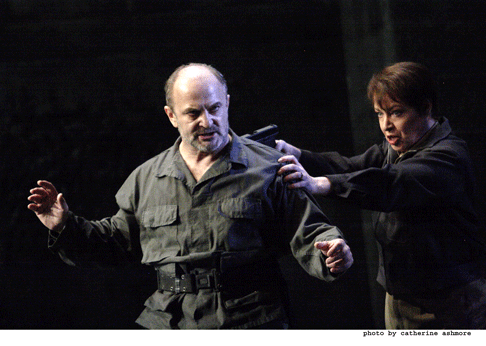![Nina Stemme as Leonore [Photo by Catherine Ashmore courtesy of The Royal Opera]](http://www.operatoday.com/2471ashm_597-STEMME-AS-LEON.gif)
04 Apr 2011
Literalism and Truth: Fidelio, Royal Opera
Proof that literalism isn’t truth: Jürgen Flimm’s production of Beethoven’s Fidelio, first heard at the Met and at the Royal Opera House, London in 2007.
English Touring Opera are delighted to announce a season of lyric monodramas to tour nationally from October to December. The season features music for solo singer and piano by Argento, Britten, Tippett and Shostakovich with a bold and inventive approach to making opera during social distancing.
This tenth of ten Live from London concerts was in fact a recorded live performance from California. It was no less enjoyable for that, and it was also uplifting to learn that this wasn’t in fact the ‘last’ LfL event that we will be able to enjoy, courtesy of VOCES8 and their fellow vocal ensembles (more below …).
Ever since Wigmore Hall announced their superb series of autumn concerts, all streamed live and available free of charge, I’d been looking forward to this song recital by Ian Bostridge and Imogen Cooper.
The Sixteen continues its exploration of Henry Purcell’s Welcome Songs for Charles II. As with Robert King’s pioneering Purcell series begun over thirty years ago for Hyperion, Harry Christophers is recording two Welcome Songs per disc.
Although Stile Antico’s programme article for their Live from London recital introduced their selection from the many treasures of the English Renaissance in the context of the theological debates and upheavals of the Tudor and Elizabethan years, their performance was more evocative of private chamber music than of public liturgy.
In February this year, Albanian soprano Ermonela Jaho made a highly lauded debut recital at Wigmore Hall - a concert which both celebrated Opera Rara’s 50th anniversary and honoured the career of the Italian soprano Rosina Storchio (1872-1945), the star of verismo who created the title roles in Leoncavallo’s La bohème and Zazà, Mascagni’s Lodoletta and Puccini’s Madama Butterfly.
Evidently, face masks don’t stifle appreciative “Bravo!”s. And, reducing audience numbers doesn’t lower the volume of such acclamations. For, the audience at Wigmore Hall gave soprano Elizabeth Llewellyn and pianist Simon Lepper a greatly deserved warm reception and hearty response following this lunchtime recital of late-Romantic song.
Collapsology. Or, perhaps we should use the French word ‘Collapsologie’ because this is a transdisciplinary idea pretty much advocated by a series of French theorists - and apparently, mostly French theorists. It in essence focuses on the imminent collapse of modern society and all its layers - a series of escalating crises on a global scale: environmental, economic, geopolitical, governmental; the list is extensive.
For this week’s Live from London vocal recital we moved from the home of VOCES8, St Anne and St Agnes in the City of London, to Kings Place, where The Sixteen - who have been associate artists at the venue for some time - presented a programme of music and words bound together by the theme of ‘reflection’.
'Such is your divine Disposation that both you excellently understand, and royally entertaine the Exercise of Musicke.’
Amongst an avalanche of new Mahler recordings appearing at the moment (Das Lied von der Erde seems to be the most favoured, with three) this 1991 Mahler Second from the 2nd Kassel MahlerFest is one of the more interesting releases.
‘And there was war in heaven: Michael and his angels fought against the dragon; and the dragon fought and his angels, And prevailed not; neither was their place found any more in heaven … that old serpent … Satan, which deceiveth the whole world: he was cast out into the earth, and his angels were cast out with him.’
If there is one myth, it seems believed by some people today, that probably needs shattering it is that post-war recordings or performances of Wagner operas were always of exceptional quality. This 1949 Hamburg Tristan und Isolde is one of those recordings - though quite who is to blame for its many problems takes quite some unearthing.
There was never any doubt that the fifth of the twelve Met Stars Live in Concert broadcasts was going to be a palpably intense and vivid event, as well as a musically stunning and theatrically enervating experience.
‘Love’ was the theme for this Live from London performance by Apollo5. Given the complexity and diversity of that human emotion, and Apollo5’s reputation for versatility and diverse repertoire, ranging from Renaissance choral music to jazz, from contemporary classical works to popular song, it was no surprise that their programme spanned 500 years and several musical styles.
The Academy of St Martin in the Fields have titled their autumn series of eight concerts - which are taking place at 5pm and 7.30pm on two Saturdays each month at their home venue in Trafalgar Square, and being filmed for streaming the following Thursday - ‘re:connect’.
The London Symphony Orchestra opened their Autumn 2020 season with a homage to Oliver Knussen, who died at the age of 66 in July 2018. The programme traced a national musical lineage through the twentieth century, from Britten to Knussen, on to Mark-Anthony Turnage, and entwining the LSO and Rattle too.
With the Live from London digital vocal festival entering the second half of the series, the festival’s host, VOCES8, returned to their home at St Annes and St Agnes in the City of London to present a sequence of ‘Choral Dances’ - vocal music inspired by dance, embracing diverse genres from the Renaissance madrigal to swing jazz.
Just a few unison string wriggles from the opening of Mozart’s overture to Le nozze di Figaro are enough to make any opera-lover perch on the edge of their seat, in excited anticipation of the drama in music to come, so there could be no other curtain-raiser for this Gala Concert at the Royal Opera House, the latest instalment from ‘their House’ to ‘our houses’.
"Before the ending of the day, creator of all things, we pray that, with your accustomed mercy, you may watch over us."
![Nina Stemme as Leonore [Photo by Catherine Ashmore courtesy of The Royal Opera]](http://www.operatoday.com/2471ashm_597-STEMME-AS-LEON.gif)
Proof that literalism isn’t truth: Jürgen Flimm’s production of Beethoven’s Fidelio, first heard at the Met and at the Royal Opera House, London in 2007.
A straightforward reading of Fidelio is almost a contradiction in terms. The real message is hidden, just as Florestan is hidden, because it’s too dangerous to contemplate. In 1805, the idea that one woman could bring down the system was so unlikely that an authority figure like Don Fernando had to be introduced to make the plot feasible. He’s benevolent but still an Enlightenment despot. Beethoven and his audiences were not naive. They know all too well that Leonore is theory made narrative. Symbolic, not reality.
 John Wegner as Don Pizarro and Endrik Wottrich as Florestan
John Wegner as Don Pizarro and Endrik Wottrich as Florestan
Florestan is more than a prisoner, or even an ordinary man. He’s an embodiment of “Der Edle, der für Wahrheit stritt” (the noble spirit that strives for Truth). Political and philosophical concepts are so fundamentally part of the meaning of this opera that any production that downplays the issues is a betrayal of what Beethoven believed and what the opera is really about.
Jürgen Flimm, however, takes a unswervingly literal approach, without irony or insight. No political or radical passions here. The prison isn’t a mirror of society so much as decoration. Leonore (Nina Stemme) unlocks the cell doors, and out the prisoners pop, meek and mild. Anyone with experience of prisons, even “nice” ones, knows they’re bursting with suppressed violence. So the wonderful chorus “O welche Lust, in freier Luft Den Atem leicht zu heben!” is glorious, but it’s meant to be poignant and symbolic, not literal. Things don’t change so easily. But Beethoven knew the sublime music would have an emotional effect on his listeners. Spurred into sympathy, audience attitudes might change. Only then would there be any chance of real liberation.
Fidelio is a notoriously difficult opera to stage, but there are clues in the music as well as in the stage directions. Beethoven’s Third Symphony (Eroica) is more than a random arrangement of abstract sounds. So Fidelio with its text is even more explicitly concerned with ideas beyond music. It’s much more than a narrative and clues to its meaning are embedded in abstract sound. Fidelity to the script, in the case of Fidelio, means paying attention not just to the words but to what’s happening beneath the surface making the story what it really is.
Leonore’s music in the first scenes is agitated, conveying a sense of entrapment. Yet Stemme is directed to move from one side of the stage to another, dissipating the tension. Fortunately Stemme, like Leonore, has integrity and the stage nous to sing more acutely than she might normally. She inhabits character rather than making sounds for the sake of sound. Her movements are like those of a wild bird, which cannot be caged and seeks freedom. Whether this was in Flimm’s direction, or an idea by Daniel Dooner, revival director, or Stemme’s natural instincts as actress, I don’t know. But she’s able to express more than what’s strictly in the score.
 Nina Stemme as Leonore, Kurt Rydl as Rocco and Elizabeth Watts as Marzelline
Nina Stemme as Leonore, Kurt Rydl as Rocco and Elizabeth Watts as Marzelline
Florestan isn’t easy to cast. He’s an unusually charismatic figure, even more a symbol than a man. He’s so dangerous that he must be kept in solitary in the deepest, most secret dungeon. Again, Beethoven’s abstract music offers clues. Tenor voice, as a deliberate symbol of purity against a dank, dirty background. That’s why Beethoven, normally skimpy with stage directions, specifies a well and piles of rubbish. The vocal part sits high in the register because it represents an alternative to the other male parts, all written for low bass baritone. Florestan should, ideally, shine with glowing light, standing out from the darkness around him.
Since there have been a few wonderfully lustrous Florestans in recent years, such as Jonas Kaufmann, most others suffer in comparison. Endrik Wottrich is adequate, especially given that this unimaginative production asks for nothing more. Perhaps he’d be more inspiring in a production that made more of Florestan’s alluring charisma. Here, he’s not expected to be more than stock character.
Willard White is an impressive Don Fernando. The part is written for big, compelling voices, though significantly, there’s little call for psychological complexity in his music. Don Fernando is a plot device as much as a person. Maybe good kings appoint good ministers, but history has shown that that’s not something we can count on. Again, Beethoven is commenting through music rather than through words. Similarly, Don Pizarro’s music reflects repression, but John Wegner, fortunately, makes more of it than simplistic villain.
 John Wegner as Don Pizarro and Nina Stemme as Leonore
John Wegner as Don Pizarro and Nina Stemme as Leonore
Kurt Rydl is a good solid Rocco, also vocally capable of conveying more than he’s asked to do in this production. The “gold” aria is important as it delineates Rocco’s personality. He’s not materialistic per se, but pragmatic. Not evil enough to kill Florestan, but weak enough to let Don Pizarro do the dirty work. Despots don’t get want they want without “innocent” followers. Elizabeth Watts’s Marzelline is charming, but again barely developed in stage terms. It’s a waste of her very considerable talents as singer and actress. She’s capable of much more. Perhaps Flimm’s too concerned with the trappings of marriage, like bouquets, rather than the spirit of marriage, which is what motivates Leonore.
It says a lot about this production that one of the most successful characters is Steven Ebel’s Jaquino. Left pretty much to his own resources by the nominal Personeregie, Ebel creates the role on his own. Though the part is relatively small, Ebel’s Jaquino comes over as fully thought through and convincing. In his own way, Jaquino is a male counterpart to Leonore. Both are faithful in love, both unfazed by difficult situations. Jaquino’s role is to Leonore’s, a recapitulation of a main theme. Again, Beethoven’s clues lie in the music, not just words.
The choruses in Fidelio are important because they represent the wider world, as opposed to the isolated charcaters in the main roles. The Royal Opera House Chorus is always very good. The voices in the chorus “O welche Lust” were very well balanced, so the effect of sound moving across the ensemble was well realized. The big choruses at the end were stunning. “Heil sei dem Tag, Heil sei der Stunde” sounds like chorale. Commitment expressed with quasi-religious fervour. At last the stage is lit brightly and gloom dispelled. But Flimm places neatly dressed wives and children in the chorus. But while Fidelio celebrates loyalty in marriage, it isn’t really about family, per se.
Sir Mark Elder replaced Kyril Petrenko as conductor on short notice. Elder is nearly always good and reliable, but this time the pace was sluggish, textures spread too far and without much sense of form and dynamics. Maybe the lacklustre production was getting to him as well. Fidelio is so much more than literal narrative. Stripped of conceptual context, it’s nullified, as music as well as theatre. “Wahre Liebe fürchtet nicht.” True love can’t be suppressed. Flimm’s lumpen production proves that literalism kills veracity.
Anne Ozorio